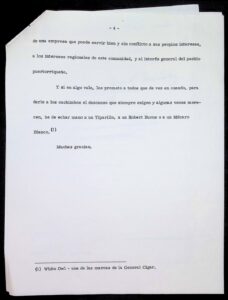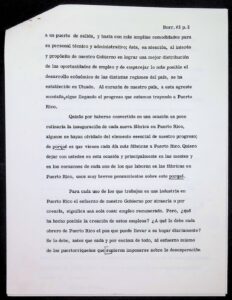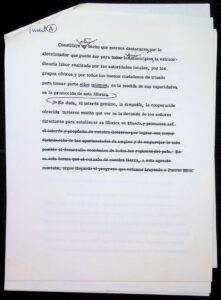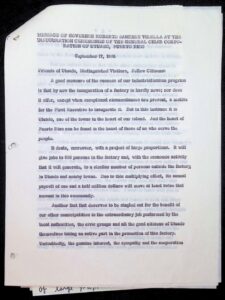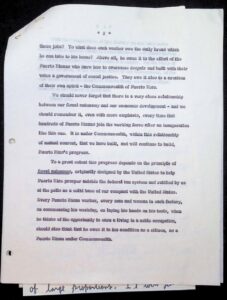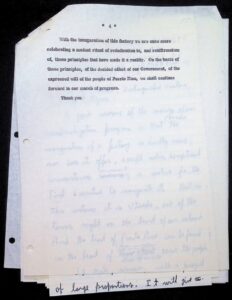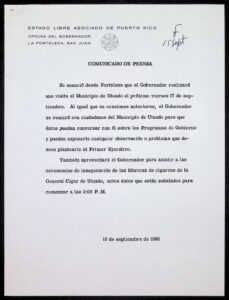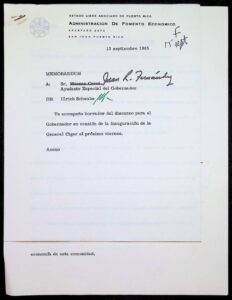General Cigar in Utuado: Industrial Dreams and Political Realities in 1960s Puerto Rico
Javier J. García Quiñones
MA Student, Latin American and Caribbean Studies, University of Connecticut
PRAC Summer Mellon Intern, 2025
Introduction: A Factory Arrives in the Mountains
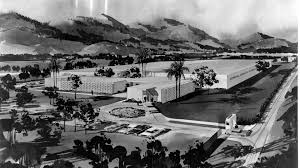 On September 17, 1965, Governor Roberto Sánchez Vilella stood before a crowd in Utuado, Puerto Rico, to inaugurate the General Cigar Corporation’s new factory. The event was more than a ribbon-cutting; it was a carefully staged symbol of the island’s industrial ambitions. Yet, behind the fanfare, memos and drafts of the governor’s speech reveal a deeper story of political tensions, economic promises, and the fragile realities of rural development.
On September 17, 1965, Governor Roberto Sánchez Vilella stood before a crowd in Utuado, Puerto Rico, to inaugurate the General Cigar Corporation’s new factory. The event was more than a ribbon-cutting; it was a carefully staged symbol of the island’s industrial ambitions. Yet, behind the fanfare, memos and drafts of the governor’s speech reveal a deeper story of political tensions, economic promises, and the fragile realities of rural development.
This blog draws on archival documents, speech drafts, guest lists, and internal memos to examine how General Cigar became an opportunity for Governor Roberto Sánchez Vilella to remind people of the Popular Democratic Party’s (PPD) vision of progress under the Commonwealth.
Contexts: Roberto Sánchez Vilella, Utuado, and the General Cigar Corporation
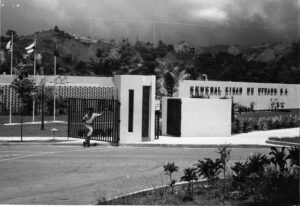 Roberto Sánchez Vilella served as Puerto Rico’s governor from 1964 to 1968, becoming the second elected leader of the Commonwealth. Before his term, he held key roles under Governor Luís Muñoz Marín, including contributing to Puerto Rico’s Constitution. Born in Mayagüez in 1913, he earned an engineering degree from Ohio State University and later worked in public administration, including the Puerto Rico Emergency Relief Administration (PRERA) and the Garzas Lake hydroelectric project. A co-founder of the Popular Democratic Party (PPD) in 1938, Sánchez Vilella held multiple cabinet positions, including Secretary of State. As governor, he expanded social reforms, reorganized the government, and promoted young leaders, actions that caused tension with Muñoz Marín. When the PPD rejected his re-election bid, he formed the People’s Party (Partido del Pueblo), splitting the PPD’s vote and leading to its 1968 defeat, the first since 1948. After politics, he taught at the University of Puerto Rico and briefly returned as a PPD Senate candidate in 1972. Recognized for his administrative contributions, buildings and highways bear his name, and a bust of him stands in the Capitol. He died in San Juan on March 24, 1997.[1]
Roberto Sánchez Vilella served as Puerto Rico’s governor from 1964 to 1968, becoming the second elected leader of the Commonwealth. Before his term, he held key roles under Governor Luís Muñoz Marín, including contributing to Puerto Rico’s Constitution. Born in Mayagüez in 1913, he earned an engineering degree from Ohio State University and later worked in public administration, including the Puerto Rico Emergency Relief Administration (PRERA) and the Garzas Lake hydroelectric project. A co-founder of the Popular Democratic Party (PPD) in 1938, Sánchez Vilella held multiple cabinet positions, including Secretary of State. As governor, he expanded social reforms, reorganized the government, and promoted young leaders, actions that caused tension with Muñoz Marín. When the PPD rejected his re-election bid, he formed the People’s Party (Partido del Pueblo), splitting the PPD’s vote and leading to its 1968 defeat, the first since 1948. After politics, he taught at the University of Puerto Rico and briefly returned as a PPD Senate candidate in 1972. Recognized for his administrative contributions, buildings and highways bear his name, and a bust of him stands in the Capitol. He died in San Juan on March 24, 1997.[1]
 Founded in 1739, Utuado, known as the “Ciudad del Viví”, is a mountainous municipality in central Puerto Rico. Named after the Taíno cacique Otoao, Utuado boasts a rugged terrain with a lush geography, featuring rivers, karst caves, and reservoirs, such as Caonillas and Dos Bocas, as well as the Río Abajo State Forest. Its mining region holds gold and copper deposits, while hydroelectric dams power the island. Once a Taíno stronghold, Utuado preserves its Indigenous heritage alongside colonial history, marked by the Caguana Indigenous Ceremonial Park (a primary Taíno archaeological site) and its 18th-century parish church. The town played a role in the 1950 Nationalist Revolt.
Founded in 1739, Utuado, known as the “Ciudad del Viví”, is a mountainous municipality in central Puerto Rico. Named after the Taíno cacique Otoao, Utuado boasts a rugged terrain with a lush geography, featuring rivers, karst caves, and reservoirs, such as Caonillas and Dos Bocas, as well as the Río Abajo State Forest. Its mining region holds gold and copper deposits, while hydroelectric dams power the island. Once a Taíno stronghold, Utuado preserves its Indigenous heritage alongside colonial history, marked by the Caguana Indigenous Ceremonial Park (a primary Taíno archaeological site) and its 18th-century parish church. The town played a role in the 1950 Nationalist Revolt.
Utuado’s economy historically relied on agriculture, particularly coffee, and later tobacco production. In fact, its 19th-century coffee boom fueled its growth, earning its city status in 1894. After the U.S. occupation (1898), economic shifts led to tobacco’s rise, highlighted by General Cigar’s operations in the second half of the 20th century. The corporation arrived in 1960, employing over 600 people and making Utuado a key tobacco producer until its closure in 1979. Beginning in the 1990s, it revived its coffee production, becoming Puerto Rico’s second-largest coffee producer.[2]
By 1928, General Cigar became Puerto Rico’s second-largest tobacco buyer, operating its own leaf-processing facilities. In the 1950s, it experimented with hydroponic tobacco (Cayey) but abandoned the project in 1962 due to poor leaf quality. The company established a leaf-processing subsidiary in Caguas (1954), employing 250+ workers (primarily women), later expanding with the help of tax incentives from the Banco de Fomento. In 1965, General Cigar opened a fully mechanized cigarillo factory in Utuado, exempt from using local tobacco, sparking resentment among growers.[3] The plan to open a high-quality, large-scale cigar factory attracted major U.S. entrepreneurs. To prepare, a group of Puerto Ricans was sent to Boston in 1964 for months of machinery training. That same year, a pilot plant (non-production) was established to train hundreds of future employees. On September 17, 1965, Governor Roberto Sánchez Vilella, government officials, and industry leaders inaugurated General Cigar’s Utuado factory, known as “La Planta Grande”. Located on the Salto Arriba highway, it employed 600 people and became the world’s largest cigarillo factory, producing three brands: Robert Burrs Panetellas, Robert Burrs Tiparillo, and White Owl Invisible. However, during its existence, and despite tax incentives and low labor costs, General Cigar prioritized imported leaf and mechanization over local tobacco, leaving a mixed economic legacy in Puerto Ricoiii. Despite boosting Utuado’s economy, the factory closed abruptly in 1979 without explanation. Today, the abandoned structure is used for livestock.[4]
Governor Sánchez Vilella’s speeches
Key Themes & Quotes
Industrial Progress as Routine
The speech starts by noting that factory inaugurations were no longer extraordinary events, reflecting Puerto Rico’s industrial success:
“Una de las mejores medidas del éxito del programa de desarrollo industrial de Puerto Rico es que ya la inauguración de una fábrica apenas constituye una noticia.”
(Translation: “One of the best measures of the success of Puerto Rico’s industrial development program is that factory inaugurations are hardly news anymore.”)
Economic Impact on Utuado
Highlights the plant’s job creation and multiplier effect:
“Va a dar empleo a varios centenares de personas… su nómina anual de millón y medio de dólares… ha de mover por lo menos el doble de esa suma en la economía de esta comunidad.”
(Translation: “It will employ several hundred people… its annual payroll of around $1.5 million… will circulate at least double that amount in this community’s economy.”)
Qualitative Industrial Development
Emphasizes a shift from mere job creation to balanced regional growth:
“Constituyen una nueva etapa en tanto en cuanto significan que… procede comenzar a preocuparnos… por otros factores de considerable importancia para el desarrollo equilibrado del país.”
(Translation: “This marks a new stage insofar as… we must now focus on other factors vital for the country’s balanced development.”)
Utuado’s Strategic Choice
Credits the plant’s location to government incentives and corporate social responsibility:
“En atención… al interés de nuestro Gobierno en lograr una mejor distribución de las oportunidades de empleo… la General Cigar se ha establecido en Utuado.”
(Translation: “In line with our Government’s goal to better distribute employment opportunities… General Cigar chose Utuado.”)
Recognition of Collaboration
Praises Utuado’s community spirit and General Cigar’s leadership:
“Felicito a los directores de la General Cigar, a mis compatriotas de Utuado… por este magnífico logro.”
(Translation: “I congratulate General Cigar’s directors, my fellow Utuadeños… for this magnificent achievement.”)
Personal Touch & Brand Nod
Closes with a lighthearted pledge to smoke the factory’s cigars (Tiparillo, Robert Burns, White Owl):
“Les prometo… he de echar mano a un Tiparillo, a un Robert Burns o a un Múcaro Blanco.”
(Translation: “I promise you… I’ll occasionally reach for a Tiparillo, a Robert Burns, or a White Owl.”)
Industrialization as Routine Progress
Reinforces the normalization of factory openings as a sign of success, but highlights Utuado’s significance:
“Una buena medida del éxito de nuestro programa de industrialización es que ya la inauguración de una fábrica apenas constituye una noticia… Pero se trata de Utuado, se trata de uno de los pueblos en el corazón de nuestra isla.”
(Translation: “A good measure of our industrialization program’s success is that factory inaugurations are hardly news… But this is Utuado, a town in the heart of our island.”)
Economic Impact & Regional Equity
Specific job numbers and multiplier effect are emphasized:
“Va a dar empleo a 600 personas… su nómina anual de millón y medio de dólares ha de mover por lo menos el doble de esa suma en la economía de esta comunidad.”
(Translation: “It will employ 600 people… its annual payroll of $1.5 million will circulate at least double that in this community’s economy.”)
Credits Utuado’s civic efforts for attracting the factory, framing it as a model for decentralized growth:
“Constituye hecho que merece destacarse… la extraordinaria labor realizada por las autoridades locales… para tomar parte ellos mismos en la promoción de esta fábrica.”
(Translation: “It’s noteworthy… the extraordinary work by local leaders… to promote this factory themselves.”)
Political Ideology & ELA’s Role
Explicitly ties job creation to Puerto Rico’s political status and fiscal autonomy:
“No debemos olvidarnos nunca… que hay una estrecha relación entre nuestra autonomía fiscal y nuestro desarrollo económico.”
(Translation: “We must never forget… the close link between our fiscal autonomy and economic development.”)
Attributes progress to the ELA’s “mutual agreement” with the U.S.:
“Es sobre esta relación de mutuo acuerdo que hemos construido… el progreso de Puerto Rico.”
(Translation: “It’s on this mutual agreement that we’ve built… Puerto Rico’s progress.”)
Worker-Centric Messaging
Directly addresses laborers, linking their jobs to collective Puerto Rican resilience:
“Se lo debe… al esfuerzo mismo de los puertorriqueños que supieron imponerse sobre la desesperación y la desidia.”
(Translation: “They owe it… to Puerto Ricans who overcame despair and neglect.”)
Notable Differences from Draft #1
Stronger ELA Advocacy: Draft #2 explicitly connects the factory to Puerto Rico’s political status (Estado Libre Asociado), absent in Draft #1.
Worker Focus: Adds a moral appeal to laborers, framing jobs as a product of citizenship and social justice.
Utuado’s Agency: Highlights local civic efforts more prominently than Draft #1’s emphasis on government incentives.
Tighter Structure: Omits the personal cigar-brand anecdote, ending with a solemn call to uphold ELA’s principles.
Historical Significance
PPD Ideology: Reflects Sánchez Vilella’s push to align industrial growth with the ELA’s legitimacy, amid growing debates over Puerto Rico’s status.
Rhetorical Shift: Draft #2 is more politically charged, using the inauguration to reaffirm the PPD’s developmentalist narrative.
Analysis of Governor Sánchez Vilella’s Final Speech for General Cigar’s Utuado Inauguration (1965)
Key Themes & Quotes (Final Version)
Industrialization as Routine Yet Significant
Reiterates that factory openings are now commonplace but stresses Utuado’s symbolic importance:
“A good measure of the success of our industrialization program is that by now the inauguration of a factory is hardly news… But in this instance, it is Utuado, one of the towns in the heart of our island.”
Economic Impact & Regional Equity
Specific job numbers and economic multiplier effect:
“It will give jobs to 600 persons in the factory… its annual payroll of one and a half million dollars will move at least twice that amount in this community.”
Credits Utuado’s civic engagement for attracting the factory:
“The extraordinary job performed by the local authorities… had weight on the decision taken by the Board of Directors to establish their factory in Utuado.”
Political Ideology & ELA’s Role
Explicitly ties job creation to Puerto Rico’s Commonwealth status (Estado Libre Asociado):
“They owe it also to a creation of their own spirit—the Commonwealth of Puerto Rico… We should never forget that there is a very close relationship between our fiscal autonomy and our economic development.”
Links progress to U.S.-Puerto Rico fiscal agreements:
“This progress depends on the principle of fiscal autonomy… ratified by us at the polls as a solid base of our compact with the United States.”
Worker-Centric Messaging
Directly addresses laborers, framing jobs as a product of collective resilience:
“Every Puerto Rican worker… should also think that he owes it to his condition as a citizen, as a Puerto Rican under the Commonwealth.”
Notable Differences from Drafts #1 and #2
Polished Language: The final version is more concise and fluid, with fewer grammatical quirks.
Stronger ELA Emphasis: Expands on the Commonwealth’s role compared to Draft #1, aligning with Draft #2’s political tone but with clearer phrasing.
Omission of Personal Anecdotes: Excludes the cigar-brand reference from Draft #1, focusing squarely on policy and worker empowerment.
Structural Clarity: The final speech has a tighter narrative arc, moving from economic impact to political ideology and closing with a call to unity.
Historical Significance
PPD Legacy: Reinforces the Partido Popular Democrático’s narrative that industrialization and ELA status were interdependent.
Utuado as Symbol: Positions the factory as a triumph of decentralized growth and community collaboration.
The carefully orchestrated inauguration of General Cigar’s Utuado factory in September 1965 was never just about jobs or economic growth; it was a political performance staged at a precarious moment for the PPD. The archival trail, from the press briefing’s polished announcements to the urgent political memos, reveals how deeply this industrial project was entangled with Puerto Rico’s broader struggles over power, identity, and development.
Behind the scenes, the numbers were alarming. Just days before the event, a confidential memo laid bare the PPD’s crumbling support in Utuado: a loss of 500 votes since 1960, while the pro-statehood Republican Statehood Party, Partido Estadista Repúblicano (PER), gained 800. This wasn’t just statistics; it was a warning siren for the ruling party. Small wonder, then, that Governor Sánchez Vilella’s final speech transformed a corporate investment into a defense of the ELA itself, declaring every job proof of the Commonwealth’s viability. The factory became a political lifeline; its very location in mountainous Utuado (rather than more practical coastal sites) a calculated symbol of the PPD’s commitment to “spreading progress” beyond San Juan.
And what of the workers themselves? The press release touted the governor’s “open door” to citizens, but the factory’s abrupt closure in 1979, without explanation or viable alternatives, laid bare the fragility of this model. General Cigar’s imported tobacco and tax incentives prioritized corporate interests over Utuado’s agricultural roots, while the promised jobs evaporated like smoke from its cigarillos.
Why This History Matters Today
Sánchez Vilella remains an understudied figure, but his handling of the Utuado factory speaks volumes about the PPD’s late-1960s crossroads. The memos capture a party clinging to industrial pageantry even as its grassroots foundations weakened—a dynamic that would culminate in the PPD’s shocking 1968 electoral defeat. The abandoned factory, now repurposed as a livestock barn, stands as more than a relic. It’s a question: When does “progress” become performance? The documents urge us to look beyond ribbon-cuttings and payroll statistics, to ask who truly benefits, and who gets left behind, when development is dictated from above.
For Further Research
- Sánchez Vilella’s conflicted legacy: How did his reforms (or lack thereof) shape the PPD’s decline?
- Oral histories from Utuado workers: What happened to those 600 employees after 1979?
- Comparative analysis: How did other PPD-backed factories fare in Puerto Rico’s interior?
The archives do not just recount history; they challenge us to learn from it. General Cigar’s story isn’t just about a failed factory; it is about the enduring cost of mistaking political symbolism for real change.
All documents: Fondo Fortaleza, Subfondo Hon. Roberto Sánchez Vilella, (serie #2) Discursos y Mensajes, caja #149–Archivo General de Puerto Rico.
Notes:
[1] Roberto Sánchez Vilella – EnciclopediaPR. (n.d.). Retrieved August 9, 2025, from https://enciclopediapr.org/content/roberto-sanchez-vilella/.
[2] Municipio de Utuado – EnciclopediaPR. (n.d.). Retrieved August 9, 2025, from https://enciclopediapr.org/content/municipio-de-utuado/.
[3] Baldrich, J. J. (2022). Smoker beyond the sea: The story of Puerto Rican tobacco. University Press of Mississippi.
[4] Industrias. (n.d.). Retrieved August 9, 2025, from http://www.sandraenriquezseiders.com/Trabajos/Utuado/generalcigar.html.
Copyright 2025



